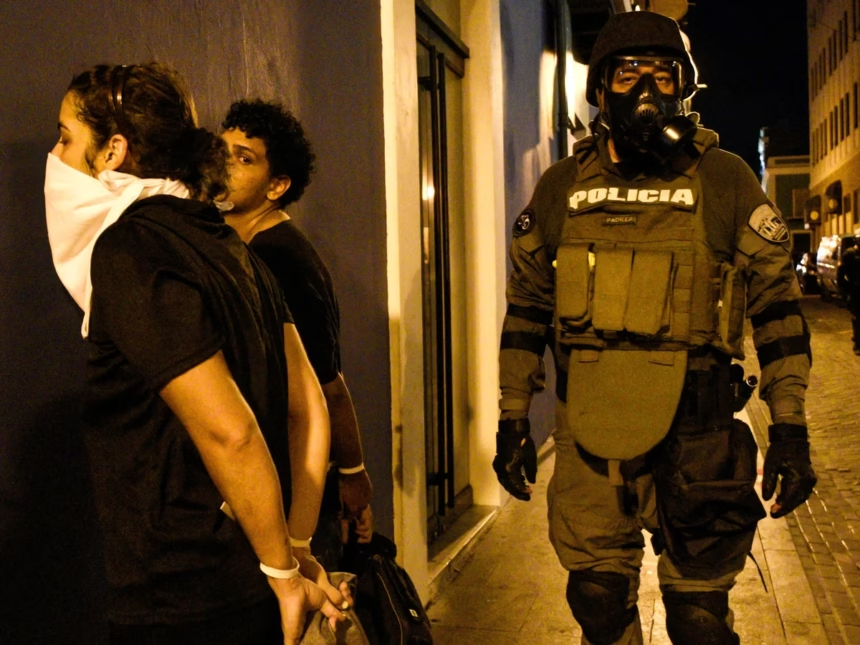While the Dominican government conducts an aggressive deportation campaign against Haitian immigrants, often criticized as racist by organizations, Dominicans in Puerto Rico are experiencing similar treatment.
Since the resumption of major deportation operations under President Donald Trump’s administration, the streets of Puerto Rico have once again become the scene of arrests conducted by U.S. Immigration and Customs Enforcement (ICE) agents.
With the majority of those arrested being from the Dominican Republic, a sensitive issue resurfaces: racial profiling.
Dolores Espiritusanto, a Dominican-born naturalized American citizen, lives in Barrio Obrero, one of the neighborhoods most densely populated by immigrants.
Outside her home, she admits to living in constant fear of arbitrary checks: “You think there are just a few of them? There are many,” she says, referring to ICE agents. She explains that despite her years in Puerto Rico, her accent still reveals her origins. “When I speak, people know I’m not Puerto Rican,” she says with a laugh, but the concern is real, NPR reported.
She keeps a copy of her American passport card in her car, which she shows while saying: “If I show them this, they have no right to take me.” Yet, even being legal doesn’t eliminate the fear. “When they stop you, you get nervous, even if you’re here legally.”
According to figures released by ICE, approximately 500 arrests have been made on the island since President Trump returned to power. Among those arrested, 75% are Dominican nationals. Some of these arrests occur at workplaces, others simply on the street. What’s concerning is the recurring pattern: agents approaching groups of Black individuals, listening to them speak, then demanding their papers.
For José Rodriguez, president of the Dominican Human Rights Committee, there’s no doubt about it: “80% of Dominicans are Black. That’s why they’re victims of racial profiling. Because they’re Black.” He closely monitors ICE operations and reports numerous cases of individuals with legal status being arrested simply because they weren’t carrying their resident cards. Some were only released after verification.
Rodriguez summarizes the situation succinctly: “There’s only one reason why legal residents, who have done nothing wrong, are being arrested under the pretext of being undocumented: it’s because they’re victims of profiling.”
Responding to these accusations, Rebecca Gonzalez-Ramos, head of ICE’s Homeland Security Investigations (HSI) unit in Puerto Rico, denies any discrimination. “I completely disagree with that. It would be highly irresponsible of us to target individuals solely because they have a Dominican accent,” she told NPR.
She acknowledges that her agents may question people on the street but maintains this occurs only when searching for specific individuals with deportation orders. “Especially here in Puerto Rico, we come in all colors. Basing actions on color or accent is illegal. That’s not how HSI operates. We act on intelligence, with arrest warrants or final deportation orders.”
However, for many Dominicans on the island, these assurances do little to ease their concerns.
Pastor Nilka Marrero, who leads a church in the Dominican neighborhood, shares her perspective. As a light-skinned Puerto Rican with blue eyes and blonde hair, she notes, “I walk through the barrio, I’ve never been stopped. Nobody even looks at me.” For her, the reality is stark: “If you’re Black, if you walk like a Dominican or look Dominican, they’ll pick you up.”
This reality forces her to have difficult conversations with her congregation. “I tell them to try to mask their origin, to speak Puerto Rican Spanish, not Dominican Spanish, to blend in a little so they won’t be noticed.” She reluctantly acknowledges the necessity of such advice. “Do you really need to style your hair that way? When you go to the grocery store, do you have to wear that headscarf?” She concludes resignedly: “I hate telling them to hide who they are, but I don’t want them to get arrested.”
While Dominicans are omnipresent in Puerto Rican society, they remain vulnerable to racial discrimination deeply rooted in the archipelago’s history. Their experiences in Puerto Rico parallel those of Haitians in their home country, where immigrant rights organizations speak of unprecedented racial discrimination. Every day, thousands of Haitians are repatriated to Haiti, including children and pregnant women who have been arrested in hospital beds while preparing to give birth.
In 2013, the Constitutional Court of the Dominican Republic issued a highly controversial decision—Ruling 168-13—that fundamentally altered nationality rights for people of Haitian descent born on Dominican soil. Applied retroactively to 1929, this measure restricted the principle of birthright citizenship, affecting up to 245,000 individuals, many of whom became stateless, according to the Center for Migration Studies in New York.
Credit: Based on reporting by Adrian Florido, NPR News, San Juan. Additional information from the New York Times and ICE official statements.







